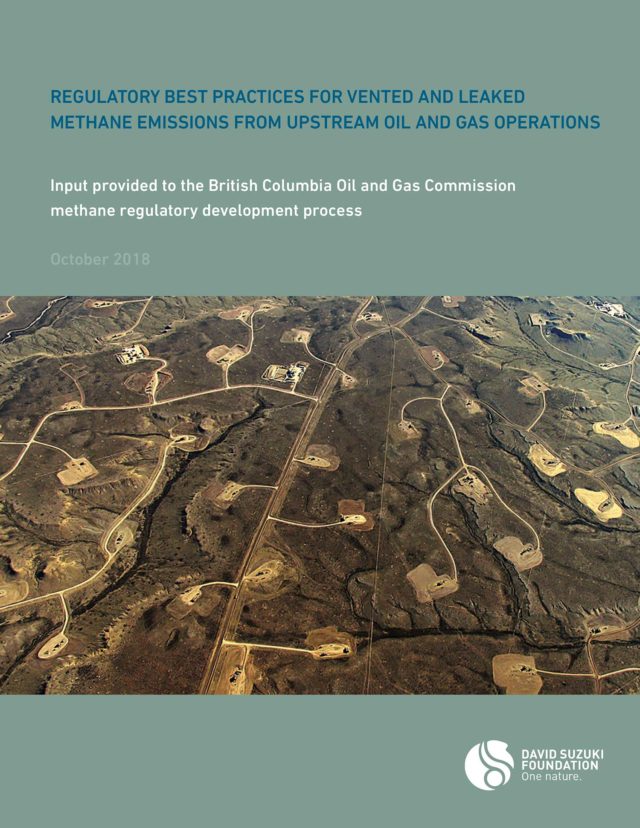Regulatory Best Practices for Vented and Leaked Methane Emissions from Upstream Oil and Gas Operations
Published by:
David Suzuki Foundation and partners
Partners:
Clean Air Task Force,
Pembina Institute
ISBN:
978-1-988424-24-8
Climate solutions methane pollution, British Columbia, greenhouse gas emissions, energy, climate change, policy and regulation
British Columbia is facing a choice. In April 2018, the Government of Canada published regulations to reduce methane emissions by at least 40 to 45 per cent by 2025 and called on provinces to either adopt the federal regulations or develop their own to achieve equivalent reductions. This matters because methane is one of the most harmful climate pollutants, and research shows emissions have been consistently underreported. Furthermore, these emissions have been exempt from policies and regulations such as the carbon tax that are applied to other industries and households to reduce their impact on the climate.
The B.C. government has stated its intention to meet the methane pollution reduction goal through strong regulations. However, to follow through on its commitment, the province must adopt best practice regulations from jurisdictions that have successfully taken action on methane pollution. By taking this approach, B.C. can implement one of the cheapest, most effective climate solutions.
Methane matters
- Methane is an extremely potent greenhouse gas that traps 84 times more heat than carbon dioxide in the atmosphere over a 20-year time frame.
- Recent peer-reviewed research has demonstrated that the volume of methane emissions in B.C. is at least 2.5 times greater than previous provincial government estimates.
- Reducing methane pollution is the most inexpensive and effective action the B.C. government can do to take action on climate change.
- Most methane emission reductions can be achieved at net-zero cost to industry by trapping and selling gas that would otherwise be released to the atmosphere or destroyed through flaring.
- Other jurisdictions, including many U.S. states and Mexico, have shown that strong regulations to reduce methane pollution can be implemented while simultaneously growing the oil and gas industry.
- B.C. should not follow the example set by Alberta through its recent regulations, which do not achieve targets set by the federal government.
Recommendations
To successfully reduce methane pollution in line with federal and provincial targets, B.C. should adopt world-class regulations that:
- Require quarterly leak detection and repair.
- Offer incentives for operators to implement continuous monitoring.
- Reduce and eliminate intentional methane venting.
- Prioritize gas capture and utilization over destruction (i.e., flaring).
- Require zero-bleed, non-emitting equipment where possible.
- Require vapour collection and recovery.
- Require regular replacement of parts known to leak when worn.
- Require regular and transparent inspections, with thorough and transparent record-keeping and public reporting
